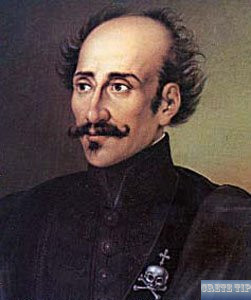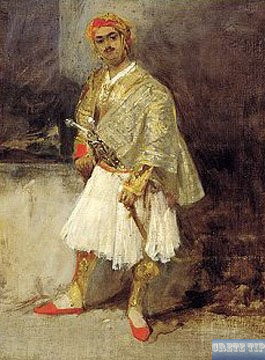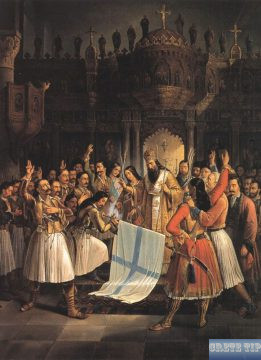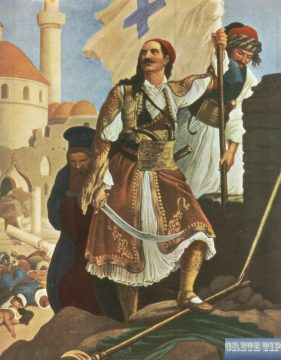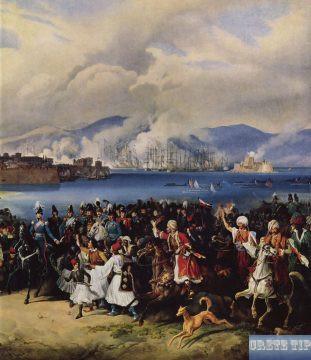The Greek Revolutionary War of Independence of 1821. The outbreak of the Greek Revolution and the subsequent War of Independence is now 204 years ago.
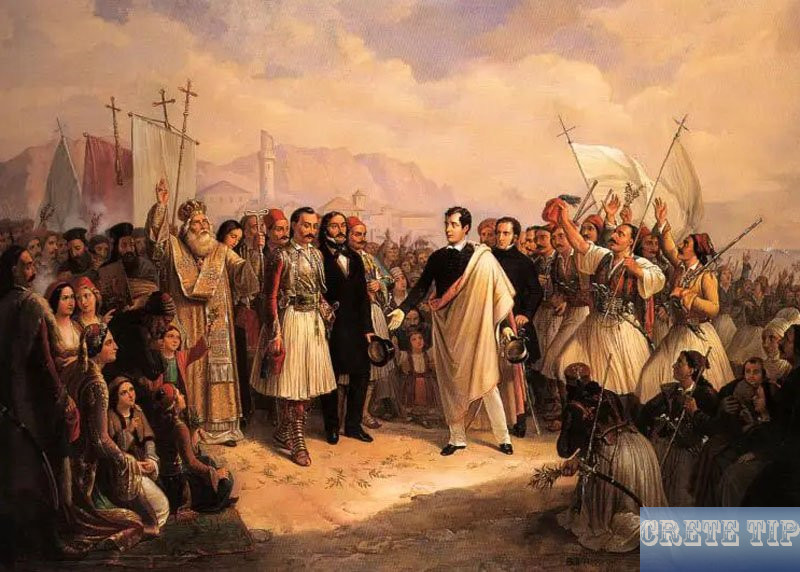
The Greek Revolution of 1821
The Greek Revolution of 1821 (also known as the Greek War of Independence) was a successful nationalist uprising waged by Greek revolutionaries against the Ottoman Empire between 1821 and 1830. This pivotal conflict resulted in the establishment of the independent Kingdom of Greece, marking the first successful secession from the Ottoman Empire.
Overview
Origins and Causes
Several factors contributed to the revolution:
– The growth of Greek nationalism and the influence of Enlightenment ideas.
– The decline of Ottoman power in the region.
– The formation of secret societies like the Filiki Eteria (Friendly Society), established in 1814.
– Economic grievances among Greeks under Ottoman rule.
– Cultural Renaissance (known as the Greek Enlightenment) which revived interest in ancient Greek heritage.
– Inspiration from other European revolutionary movements.
Major Events and Phases
Outbreak (1821)
– The revolution officially began in March 1821 when Metropolitan Germanos of Patras raised the Greek flag at the Monastery of Agia Lavra.
– Alexander Ypsilantis led an uprising in Moldavia that ultimately failed.
– Peloponnesian Greeks achieved early successes against Ottoman forces.
Middle Period (1822-1827)
– Greeks established provisional governments and drafted early constitutions.
– Civil wars among Greek factions weakened the revolutionary effort.
– Ottoman Sultan called upon Egyptian forces led by Ibrahim Pasha to suppress the revolution.
– Fall of Missolonghi (1826) after a heroic siege became a rallying point for international sympathy.
Great Power Intervention (1827-1830)
– European philhellenism (pro-Greek sentiment) grew throughout Europe.
– The Treaty of London (1827) established Russia, France, and Britain as mediators.
– The Battle of Navarino (October 1827) saw allied European fleets destroy the Ottoman-Egyptian fleet.
– Russia declared war on the Ottoman Empire (1828-1829).
– The Treaty of Adrianople (1829) and the London Protocol (1830) established Greek independence.
Significance and Legacy
– Created the first independent nation-state in the Balkans.
– Inspired other national independence movements throughout the Ottoman Empire.
– Reinforced the concept of philhellenism and European cultural connection to ancient Greece.
– Established a precedent for Great Power intervention in the region.
– Contributed to the ongoing decline of the Ottoman Empire.
– The modern Greek state views 1821 as its founding moment and celebrates March 25 as a national holiday.
The revolution came at great human cost, with significant casualties on both sides and destruction of property, but ultimately succeeded in establishing a Greek nation-state after nearly four centuries of Ottoman rule.
Course of the Greek Revolution
February 24, 1821, is generally considered the birth of the Greek Revolution, when Alexander Ypsilantis published his proclamation to the Greeks in Iasi in Bessarabia, near present-day Romania. However, the attempt to inspire the Romanians with the Hellenistic idea failed, and the Russians did not want to get involved either, so the revolutionary movement from the north collapsed after the defeat of Dragashan.
The beginning of the victorious revolution in the Peloponnese is considered to be the entry of the Greek rebels into Kalamata on March 23, 1821, after the surrender of the Ottomans in the city without a fight in the face of a superior force under Petrobey Mavromichalis. Another prominent start date is March 25, 1821, when the Messinian Senate followed the issuance of the ‘Warning’ and is now an annual Greek holiday celebrating the revolution.
Planning the revolution
The first included Constantinople, where the elite of the Greek people also resided, the second the Peloponnese with the important dignitaries located there, the proestoi or community leaders, who were committed to the Hetairies and had armatoloi (armed guards) and kleftes (secret militias that acted as a national guard). The third scene was to be an invasion from Russia into Moldavia by a Greek force.
The operation in Moldova was ill-prepared and took place at an inopportune time and place. Russia opposed the Greek plans because it considered itself bound by the decisions of the Laubach Conference, in which revolutions against legitimate claims to power were not to be tolerated. Thus, the whole thing was doomed to failure there.
This part of the Ottoman Empire was a Romanian province and so the Greek invaders marched not against Turks but against Romanian villagers. At the same time, the insurgent Tudor Vladimirescu refused to support Ypsilantis, having in mind first and foremost the interests of the Romanian boyars.
Not only the powerful army of the Sultan in the capital Constantinople, but also disagreements between the different classes of Greeks in the city prevented a revolutionary movement in the polis. The riots against Greeks that followed the start of the revolution in Constantinople quickly stifled any thought of revolts there.
The start of the revolution in the Peloponnese was probably planned for a later date, but was brought forward when the Ottomans learned of the Greeks’ intentions. Other authors, on the other hand, claim that the revolution there would have started earlier had it not been delayed by the strict administration of Ali Pasha of Ioannina.
The reasons for the Greek revolution clearly emerge from the ‘Warning’ of the ‘Messinian Senate’ to the European Great Powers of March 25, 1821. The very pertinent text gives as the reason for the revolution the oppression by the Turks and that the Greeks were basically fighting for their human rights and their human dignity.
The increase in literacy, the spread of European education and the wealth accumulated by the Greeks through trade were the means for the outbreak and success of the revolution. The finances of the revolution were raised through private funds, while at times wealthy Greeks even organized and maintained military units.
The demographic parameter, as has often been shown in ancient or modern history, was a major factor in the balance of power. Greeks in the Ottoman Empire were the largest non-Muslim minority and formed the majority in the Peloponnese.
This compact Greek population in the Peloponnese and elsewhere contributed to the success of the revolt, along with their devotion to the idea of freedom, which a significant portion of Greeks had wholeheartedly embraced.
Metropolitan Germanos of Patras, who in the painting on the right is said to have blessed the Greek flag of the revolution, is instead said to have said on that day, ‘Let the children of Mohammed finish off the children of Robespierre !’
And one of the Greek dignitaries working for the Ottoman administration commented: ‘It is better for the Turks to subjugate their Christian subjects than for there to be a free nation with a people who have rights’.
Accordingly, it is an after-the-fact promoted legend that Germanos of Patras was the first to raise the standard of the 1821 Revolution. Rather, it was in Patras that the popular leader Panagiotis Karatzas raised the Greek flag and was later murdered for it by the community leaders of Patras. The Turks were then able to hold Patras in the Peloponnese until their withdrawal after the peace treaty of 1829.
The revolution of 1821 involved not only Orthodox Christians and native Greeks, but also the so-called Philhellenes from Western Europe and in the Danubian principalities Wallachians, Moldovans, Bulgarians, Albanians, Serbs, Gypsies, Hungarians, Poles and others.
Among the undecided were some dignitaries of Morea in the Peloponnese. However, their summons by the pasha to Tripolitza (Tripoli, Peloponnese) and the fear of their imminent execution allayed any misgivings they might have had. But the reluctance was partly justified and was not actually surprising. The danger from the Ottomans was real and imminent.
On the other hand, the harshness of the insurgents’ aggressiveness was also a matter of concern. For the slaughter of Muslims, especially during the liberation of Tripolitza, was just as intolerable under any circumstances, as the Ottomans also repeatedly did on various occasions.
Outbreak of the revolution
The hetairies may have originally envisaged a different timetable, but it was inevitable that, from a certain point, the disclosure of their plans and the Greeks’ great desire for freedom would wrest the situation from their control.
Therefore, although the Greek revolution was not spontaneous, since it was planned, its actual beginning was the result of other events and developments.
Moreover, the preparations of the Ottomans were dangerous for the planned revolution, because Mahmud II still organized a new army under French influence. This new army was defeated by a Russian force in its first battle under Asakir-i Mensurei Muhammediye, and a second defeat followed against Mehmed Ali of Egypt, but against a poorly organized Greek rebel army the result could have been quite different.
However, at that time Ali Pasha of Ioannina rebelled against the Ottoman administration in Constantinople and the Tsar’s officer, Aiexander Ypsilantis, who was to carry the revolution to Moldavia, gave rise to the hope that Russia would not miss the opportunity to take up arms against the Ottomans.
However, the Greeks basically believed that they would prevail even without the participation of the Europeans. This idea was confirmed, at least in the first phase of the revolution, even when the major European powers opposed it for various interests.
In any case, the warriors of Mani did not seem to have taken any of these objections into account when they took up arms against the Ottomans at Kalamat on March 23, 1821.
The revolution developed a momentum that resembled a fire approaching a powder keg. Victory followed victory for the rebels, which resulted in the liberation of Greek cities in the Peloponnese and the mainland.
The Ottomans, not to be taken by surprise, responded by mobilizing numerous troops at their disposal. However, despite their sporadic victories, they could not stop the decisive victory of the Greeks, who fought for their lives practically to the last cartridge and warrior in every battle. Thus, the Greeks managed to hold the territories liberated at the beginning of the revolution and repel the Ottoman counterattacks.
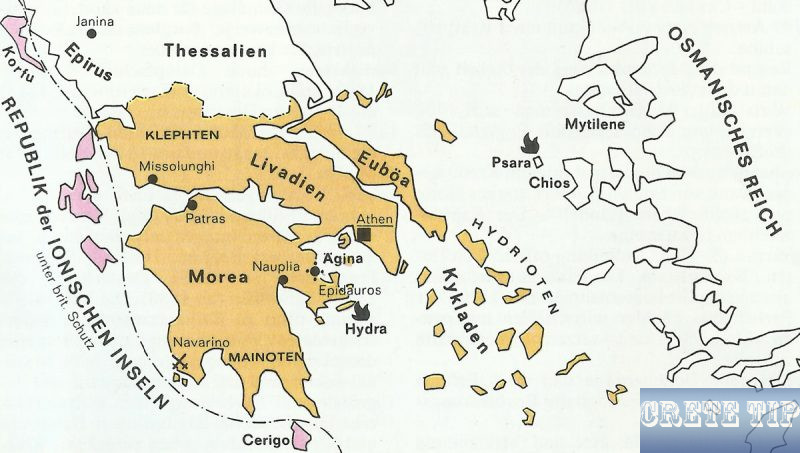
After this initial phase, the revolution stabilized and the military situation remained in a stalemate, as neither side was strong enough to bring about a decisive victory.
In this second phase, the Ottomans were forced to retreat to their bases in Thessaly after their defeats or due to adverse weather conditions in winter, while the insurgents were not strong enough for a counterattack and could not achieve a decisive victory.
The uprisings in Sterea, Macedonia and Epirus also delayed the Ottomans’ efforts to deal with the situation in the Peloponnese.
In 1822, the Greek National Congress in Epidauros proclaimed independence, which was promoted in Europe by many conservative and liberal ‘philhellenes’, including Louis I of Bavaria and Chteaubriand. Volunteers, including Britain’s Byron, gathered in Geneva and supported or fought in the War of Independence for the Greek cause. The ‘Turkish atrocity of Chios’ in 1822 also changed the European perspective on the revolution.
Another cause of the lack of military activity was the internal discord of the Greeks at that time. The political leaders, who were represented by the Phanariot Alexandros Mavrokordatos and the Hydra shipowner Georgios Koundouriotis, were at odds with their assembly, which consisted mainly of notables, dignitaries, and wealthy merchants, with the soldiers of the small regular army, the freemen, and the former kleftes loyal to Theodoros Kolokotronis. The political discord even culminated in an internal civil war in 1824 during the still ongoing revolutionary war against the Ottomans !
In addition to these conflicts, the interventions of Great Britain, France and Russia, which sought to preserve their strategic political and economic interests in the Ottoman Empire, also contributed to the failure of the revolutionary momentum to develop.
The final phase of the Greek War of Independence
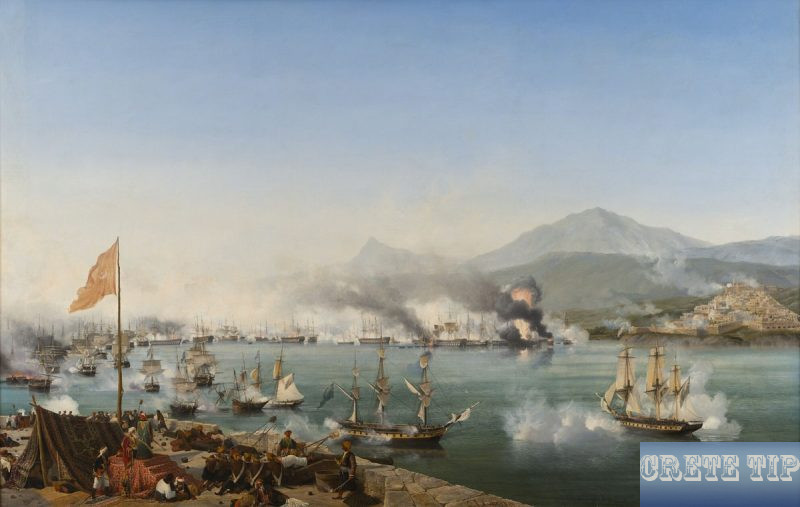
The appearance of Mehmed Ali, Pasha of Egypt and actually a vassal of the Sultan in Constantinople, in 1824 marked the beginning of the third phase of the Greek Revolution.
Ali sought to overthrow the Sultan or gain independence while ostensibly joining him to secure his favor. The Turkish-Egyptian fleet anchored at Pylos in the Gulf of Navarino, while the Turkish-Egyptian army, reformed to French standards and under French officers, began drowning the Greek Revolution in blood. In 1826, after stubborn resistance, Missolunghi falls.
In the meantime, however, the political balance system in Europe had shifted. The three great powers, Great Britain, France and Russia, could not remain passive in the face of this rather unexpected development in Greece. Although the Austrian Metternich condemned the uprising against the Sultan’s legitimate rule, the new Tsar Nicholas I was favorably disposed toward it out of Orthodox kinship, hostility to the Turks, and because of the old Russian goal of reaching the Mediterranean. Then in 1827, in the Treaty of London, Great Britain, France and Russia advocate Greek independence.
The three Great Powers now tried to end the conflict without getting into military confrontations with the Ottomans, either on land or at sea. Even if the admirals of the Allied fleet did not have direct orders, their participation in the outcome of the naval battle of Navarino in 1827 was not so ‘accidental’.
The great powers, especially Great Britain, could not tolerate Egyptian domination under the influence of France in the eastern Mediterranean, as this would undermine the balance of power.
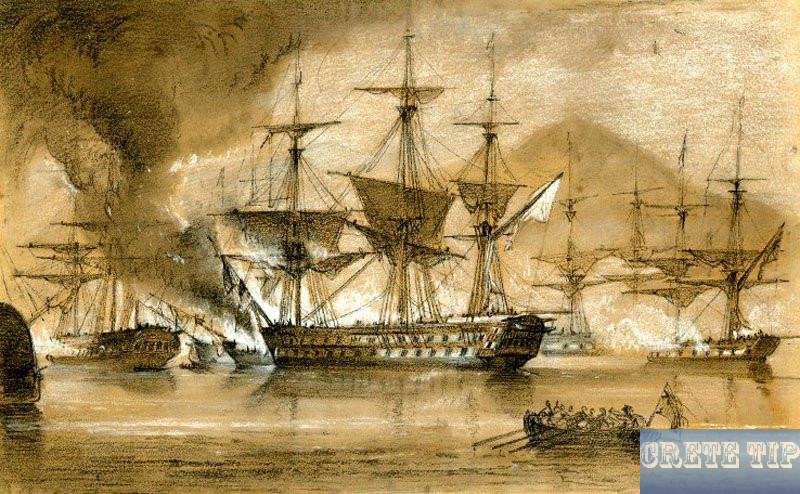
The sequence of events, as they appeared from the Turkish point of view, indicate that the Allied fleets had not entered the Gulf of Navarino merely to spend the winter, but with aggressive ulterior motives. Obviously, they had initiated the exchange of blows under the pretext that Ibrahim had not complied with what had been agreed, namely to remain inactive.
The stated goal, however, was to drive the Turkish-Egyptian fleet from the Peloponnese, or at least push it back, which was not possible under the explosive conditions. It took perhaps only an unplanned event to set off the chain reaction. It was followed by the destruction of the Turkish-Egyptian fleet by the British-French-Russian squadron.
The naval battle of Navarino was a decisive turning point for the Greek revolution. The path to Greek independence could hardly be stopped thereafter, for now the interests of the major European powers turned 180 degrees in favor of the Greeks. The death of the reluctant Tsar Alexander I and his succession by the more resolute Nicholas I in 1825, and later the fall of the British Prime Minister, the Duke of Wellington, in 1830, helped the Greek cause.
Grand Prince Kapoditrias became regent and established his own, Greek administration from Naupalia on the Peloppones. A French expeditionary force under Nicolas Joseph Maison arrived to reinforce the Greeks and liberated Morea.
In 1828-29 another Russo-Turkish war broke out, which ended under Prussian mediation in 1829 in the Peace of Adrianople (Edirne). As a result, Russia gains the Danube estuary and Greece as a protectorate.
At the London Conference of 1830, the ‘London Protocol’ is signed on February 3 with the independence of Greece, the Treaty of Constantinople and finally the Protocol of July 18 and August 3, 1832, which established the borders of Greece. However, for most Greek patriots it was clear that this could only be a first step, because more than half of the Greek population still lived outside these borders under the rule of the Sultan in Constantinople.
Otto I of Greece
After the assassination of Grand Duke Kapodistrias, Otto I of Wittelsbach was elected king. Greece gets a constitution in 1844, but the absolutist rule of the Bavarian ‘Othon’ ends in his deposition in 1862.
Another consequence of the Greek revolution is the dissolution of the ‘Holy Alliance’ because of the opposition between Russia and Austria-Hungary in the ‘Oriental question’ and the interests in the Balkans.
Otto Friedrich Ludwig von Wittelsbach, known as Otto I of Greece, was the first modern King of Greece from 1832 to 1862:
– He was born on June 1, 1815, in Salzburg, Austria.
– Otto was a Bavarian prince from the House of Wittelsbach.
– He was chosen as the first King of Greece by the Great Powers (Britain, France, and Russia) after Greece gained independence from the Ottoman Empire.
– He arrived in Greece in 1833 at the age of 17 and initially ruled through a regency council.
– Otto faced numerous challenges during his reign, including financial difficulties and political instability.
– He was deposed in a coup in 1862 and left Greece, never to return.
– After his deposition, he continued to use the title King of Greece until his death in 1867.
It’s worth noting that while Otto was the first king of modern, independent Greece, he was not the first ruler to hold the title ‘King of Greece’ in history. There were various monarchs in ancient and medieval times who ruled over Greek territories with similar titles.
dtv-Atlas Weltgeschichte (Band 2 – Von der Französischen Revolution bis zur Gegenwart)
THE GREEK REVOLUTION OF 1821: The Transition from Slavery to Freedom (Vassilios Moutsoglou)
The Greek Revolution: A Critical Dictionary (Paschalis M. Kitromilides)
Die Unabhängigkeit Griechenlands (Ruben Ygua)

